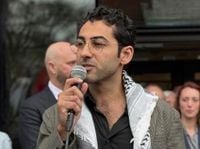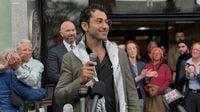A Palestinian student at Columbia University has been released after being arrested by immigration officials during a citizenship interview. Mohsen Mahdawi, a 34-year-old legal permanent resident, was detained on April 14, 2025, and held in a Vermont state prison until his release on April 30, 2025, following a ruling by U.S. District Judge Geoffrey Crawford.
Mahdawi, known for leading protests against Israel’s military actions in Gaza, walked out of the Northwest State Correctional Facility to cheers from hundreds of supporters. He raised his hands in victory, chanting slogans such as “No fear” and “Free Palestine.” In his first public remarks after his release, Mahdawi emphasized the importance of unity in the fight for justice, stating, “Never give up on the idea that justice will prevail.”
The backdrop to Mahdawi's arrest is a broader crackdown on student activists by the Trump administration, which has targeted individuals participating in pro-Palestinian protests. Since the onset of the Israel-Hamas conflict, which has resulted in the deaths of over 52,000 Palestinians, immigration authorities have reportedly arrested numerous students across the country.
Judge Crawford noted in his ruling that Mahdawi raised a “substantial claim that the government arrested him to stifle speech with which it disagrees.” He highlighted that even if Mahdawi’s views were controversial, they were protected under the First Amendment. The judge rejected the government’s argument that Mahdawi posed a national security threat, asserting that political dissent should not lead to detention.
In court, the government, represented by U.S. Attorney Michael Drescher, claimed Mahdawi’s presence in the U.S. could have “serious adverse foreign policy consequences,” a statement supported by Secretary of State Marco Rubio. Rubio has been vocal about revoking visas of students involved in protests, stating, “Every time I find one of these lunatics, I take away their visa.”
Mahdawi was born in a refugee camp in the Israeli-occupied West Bank and moved to the United States in 2014. He co-founded the Palestinian Student Union at Columbia University with Mahmoud Khalil, another student who was arrested in March 2025 and has been held in a Louisiana detention center since then. Khalil’s detention has drawn criticism for its implications on free speech and political expression.
Mahdawi's release allows him to attend his graduation in New York next month, where he is expected to complete his undergraduate studies before pursuing a master’s degree. He expressed his desire to continue advocating for human rights, stating, “We want to stand up for humanity, because the rest of the world — not only Palestine — is watching us.”
Outside the courthouse, Mahdawi addressed President Trump directly, asserting, “I am not afraid of you.” He called for love and unity in the face of oppression, saying, “If there is no fear, what is it replaced with? Love. Love is our way.”
As Mahdawi prepares for his next legal battle, he remains hopeful about his future and the future of his fellow activists. He stated, “Yes, you might think I am free, but my freedom is interlinked with the freedom of many other students.” His case, along with those of other detained students, raises significant questions about the intersection of immigration law and free speech in the United States.
Mahdawi’s legal team, which includes representatives from the American Civil Liberties Union (ACLU), argues that his detainment is a violation of his constitutional rights. The ACLU has emphasized that Mahdawi has committed no crime and that his arrest is a direct result of his political speech.
In a parallel case, Rümeysa Öztürk, a student at Tufts University, was also detained earlier this year, allegedly in retaliation for her pro-Palestinian advocacy. These incidents have sparked widespread concern among civil rights advocates, who fear that such actions are reminiscent of historical government crackdowns on dissent, such as the Red Scare and the McCarthy era.
As the U.S. government continues to grapple with the implications of immigration enforcement on free speech, Mahdawi’s case stands as a critical reminder of the ongoing struggle for civil liberties in the face of political pressure. The outcome of his immigration proceedings, set to continue with a hearing on May 1, 2025, will be closely watched by advocates and opponents alike.
In summary, Mohsen Mahdawi’s release is not just a personal victory but a significant moment in the broader fight for rights and freedoms in the United States. His story highlights the delicate balance between national security concerns and the fundamental right to free speech, a balance that continues to be tested amid rising tensions over foreign policy and domestic dissent.





